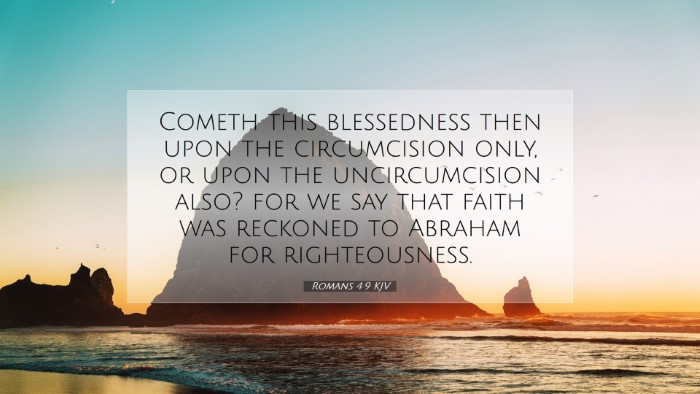Old Testament
Genesis Exodus Leviticus Numbers Deuteronomy Joshua Judges Ruth 1 Samuel 2 Samuel 1 Kings 2 Kings 1 Chronicles 2 Chronicles Ezra Nehemiah Esther Job Psalms Proverbs Ecclesiastes Song of Solomon Isaiah Jeremiah Lamentations Ezekiel Daniel Hosea Joel Amos Obadiah Jonah Micah Nahum Habakkuk Zephaniah Haggai Zechariah MalachiRomans 4:9
Romans 4:9 KJV
Cometh this blessedness then upon the circumcision only, or upon the uncircumcision also? for we say that faith was reckoned to Abraham for righteousness.
Romans 4:9 Bible Commentary
Commentary on Romans 4:9
Romans 4:9 states, "Is this blessing then upon the circumcised, or upon the uncircumcised also? For we say that faith was reckoned to Abraham for righteousness." This verse highlights the critical discussion surrounding faith, righteousness, and the covenant relationship between God and humanity, as exemplified in the life of Abraham.
Context and Significance
The Apostle Paul presents a theological argument concerning justification by faith, which is essential for both Jewish and Gentile believers. The question posed by Paul in this verse brings to light the fundamental issue of whether divine blessing is confined to a particular ethnic or religious group.
The Nature of Justification
-
Matthew Henry:
Henry emphasizes that justification is a state of being made right in the eyes of God, and it is accessible to all who believe, irrespective of their ethnic backgrounds. Abraham serves as the prime example, as his faith predated the law and circumcision, suggesting that righteousness is based on faith, not compliance with the law.
-
Albert Barnes:
Barnes notes that the question Paul poses indicates that the blessing of justification is not limited to the Jewish people alone but extends to all who have faith, regardless of their ritualistic observance. He stresses that faith itself is the true pathway to righteousness, establishing a direct relationship with God.
-
Adam Clarke:
Clarke highlights the historical and cultural tensions between Jews and Gentiles at the time, suggesting that Paul's statement was groundbreaking. He argues that the real change in covenantal understanding stemmed from the recognition that faith supersedes circumcision, thereby abolishing the exclusive claims of ethnocentric righteousness.
Theological Insights
This verse encapsulates vital theological themes that resonate through the New Testament. It challenges believers to rethink how they perceive covenant, grace, and faith.
Faith as Righteousness
-
The Role of Abraham:
Abraham is presented not merely as the father of the Jewish nation but as the spiritual father of all who believe. His faith was counted as righteousness long before the law was given, which forms the basis for the argument of grace over works. This insight encourages all to come to God through faith, as it is the divinely ordained means of receiving His blessings.
-
Inclusivity of the Gospel:
Paul’s message indicates that the promise of God is open to all who exercise faith. This scripture lays the foundation for the inclusivity of the Gospel, inviting all to partake in God's grace regardless of their circumstantial status.
Practical Applications
For theologians, pastors, and students, Romans 4:9 serves as a call to emphasize the importance of faith over works in preaching and teaching. This verse has profound implications for pastoral care, gospel proclamation, and the church's mission.
Encouragement for Believers
-
Reassurance of Salvation:
Believers should find reassurance that their faith in Christ qualifies them for God's blessing, irrespective of their background or past actions. This is a powerful message of hope.
-
Call to Unity:
The church is challenged to reflect the diversity of the body of Christ, moving beyond ethnic or cultural divisions. This verse calls for unity among believers, reinforcing that all are equally justified through faith.
Conclusion
In conclusion, Romans 4:9 is not just a verse about the nature of justification; it is a declaration of the transformative power of faith that breaks down barriers and welcomes all into the family of God. It invites deeper reflection on how we understand righteousness and the expansive nature of divine grace.


